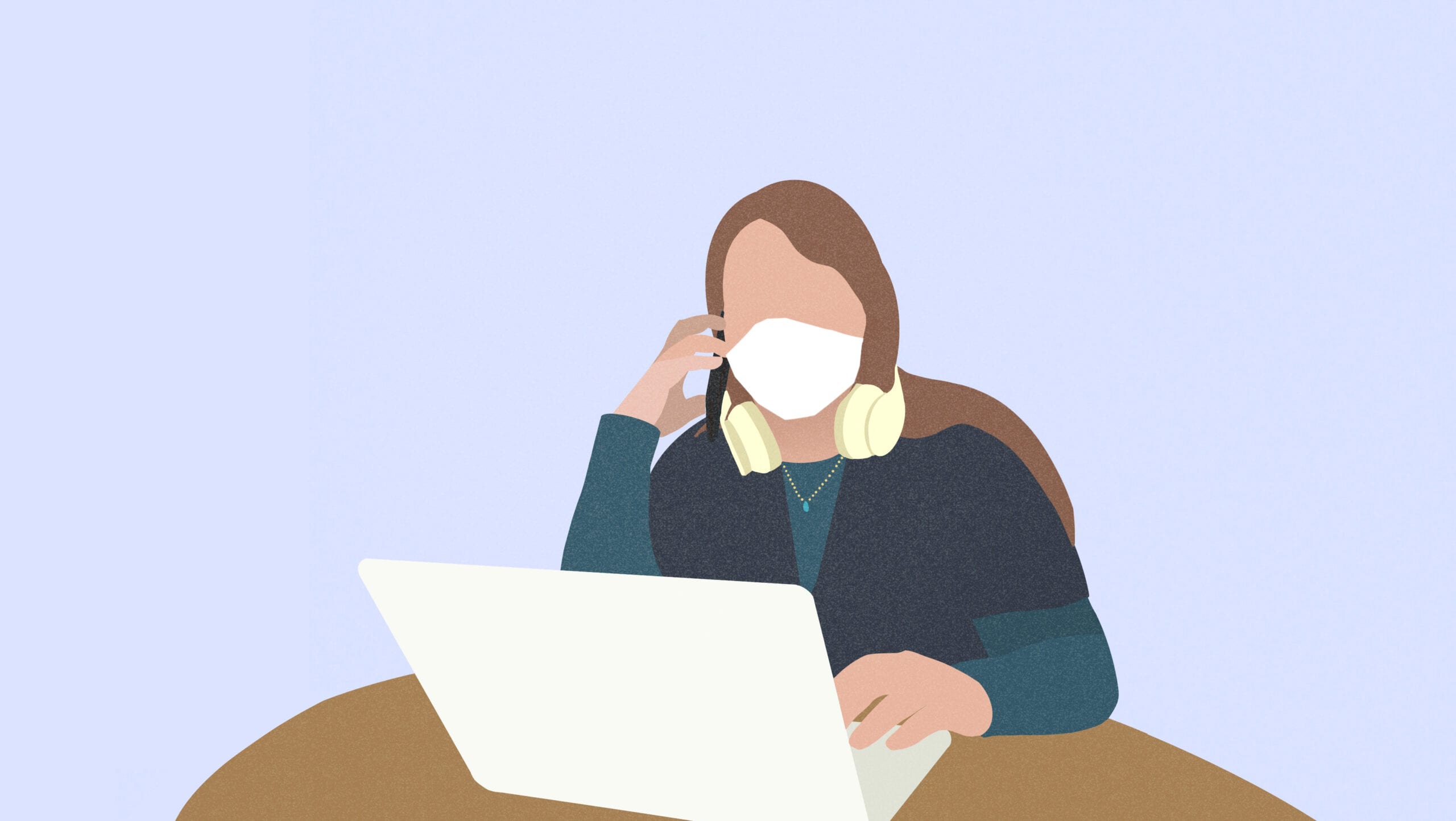On the freezer door in my kitchen, there’s an index card held in place with a bright red magnet. In bold, black letters, I’ve written an important reminder on it: “Make a ‘When I Die’ file.”
I should point out that I’m not terminally ill, just highly organized. I was a caregiver to my mom, who was dying, and it taught me that getting your shit in order—even (and especially!) when things feel relatively okay—can save you and the folks you love a lot of hassle and heartache during times of illness, injury or death. As she became increasingly sick, my mom and I finally started talking about what she wanted in terms of health and end-of-life care, but there was still so much left unsaid. I remember frantically helping her write a will and meeting with a funeral home in what turned out to be the last week of her life. It was a lot to deal with on top of my feelings about losing my mom.
I don’t want to put my chosen family in that position, so I’m tackling those conversations (and the paperwork that goes with them) now. That’s why, as part of an effort to plan ahead for my future health and end-of-life care needs, I recently finished updating the legal paperwork that outlines how I want to be cared for if I get too sick to make my own decisions. It gives two members of my chosen family the power to make medical and financial decisions for me if I’m unable to, alongside a will explaining what I want to happen to me and my stuff after I die.
I started updating this paperwork in January in a fit of New Year’s resolution-driven adulting and finished in March, just as the COVID-19 pandemic really started ramping up in Canada. These documents carry extra meaning for me now as I watch the death toll increase—at the time of this writing, there are over 100,000 confirmed cases of COVID-19 in Canada and over 8,800 people have died. A growing number of people in my life have lost friends or loved ones to the virus. Like many people, I’m aware of the possibility I could get very sick or die from COVID-19.
My queer family structure was another motivator for updating the legal paperwork that outlines who’s included in my family and who gets to make decisions on my behalf. I’m co-parenting my toddler with three other queer people, including my non-binary partner who I’m not married to. We’re definitely not the nuclear family many health-care and end-of-life laws, policies and planning tools seem to be based on. I don’t trust the medical or legal system to recognize our relationships, identities or desires so I’ve taken steps to protect myself and my chosen family by putting my wishes in writing.
So what kind of planning and paperwork am I talking about, anyway? At a broad level, I’m referring to advance care planning. It’s a process of thinking about your wishes for future health and personal care, deciding who’ll speak for you if you can’t and sharing that information with your loved ones and health care providers.
Because of my queer identity and family structure, my planning process has included getting the legal paperwork I need to designate who gets to make health and financial decisions on my behalf while I’m alive. I’ve also done estate planning by making a will so that my loved ones—and the powers that be—know what I want to happen to me and my stuff after I die. (In sharing my experiences, I want to emphasize that I’m not a lawyer or a medical professional—if you need specialized advice from an expert, please seek it out!)
Have you ever talked to your loved ones about your health-care or end-of-life wishes? Do you know what kinds of forms or legal documents your province or territory requires to formally document those wishes? Have you already completed that paperwork? I wouldn’t be surprised if the answer is no, and that’s okay—in fact, it’s pretty common. I probably wouldn’t have done it either if I hadn’t lost a parent in my mid-30s; that experience showed me what it’s like to help a loved one navigate the medical system at the end of life (not to mention what’s involved in taking care of things after someone dies).
I know these conversations and getting the paperwork to back them up can feel emotionally charged or overwhelming. The paperwork for advance care planning and end-of-life planning varies by province. It can be confusing to know where to start, especially when, as LGBTQ2 people, we’re often trying to figure out how to fit our identities, relationships and family structures into systems, laws and policies which are not designed for us.
Research shows that LGBTQ2 people lack the knowledge and resources we need to help us understand and plan for what we want—and don’t want—to happen to us if we get very sick or are dying. One study of older LGBTQ2 Canadians found that just over one-third of participants have had conversations about future care and end-of-life plans, two-thirds had a will, less than half had a power of attorney for health care and around a quarter had made informal caregiving arrangements. Researchers point out that LGBTQ2 folks may not be all that different from our straight, cisgender counterparts in this respect (and some evidence suggests we’re actually more likely to do this kind of planning).
Still, not figuring out this stuff in advance could have a bigger impact on LGBTQ2 people’s well-being because of the health disparities our communities face—disparities often exacerbated during global health crises like COVID-19. On top of that, we’re dealing with the impacts of social isolation, poverty and being more reliant on caregiving from friends and chosen family in contexts where those relationships often aren’t legally recognized. These are all made worse by the physical separation that comes with many people’s experiences of COVID-19—whether at home, or in institutional settings like hospitals or long-term care facilities.
Having these conversations and documenting your wishes won’t completely buffer you from the discrimination and systemic inequities that affect the well-being of so many LGBTQ2 people. But they might help: Studies show that people who do this kind of planning and communicate their wishes to their loved ones and health-care providers are more likely to receive medical care aligned with their preferences. Plus, it will help you and the folks you care about be better prepared to navigate the tough decisions that can come with medical emergencies. (And if you die, your loved ones won’t have to deal with the added stress of not knowing your wishes.)
Okay, so where do you start? Here are some suggestions grounded in my lived experience as a queer person who’s navigating this stuff myself.
Give yourself a gold star for advanced adulting
This process is going to take time. There’s homework involved, and you’ll probably have awkward but important conversations with people you care about. You might need advice from professionals (which can be a challenge in itself, because many of them aren’t queer- or trans-competent), and some parts may cost money. This is advanced adulting and I’m already giving you 11 million gold stars for even thinking about it.
Make an advance care planning date with yourself (and your loved ones)
There’s a free online advance care planning workbook for Canadians you can use to make your own plan (it’s also available in French and, depending on where you live, you might even be able to find one specific to your province). Filling out a workbook like this was my second step because I recently realized that, although I’d done a good job of getting my paperwork in order, I hadn’t spent enough time thinking about and talking with my loved ones about my health-care wishes. That’s why I invited my partner on an advance care planning date a couple of weekends ago (’cause I’m romantic like that). We ate delicious snacks and filled out our workbooks together one afternoon while our toddler napped.
Find out what documents are required where you live
One of the things that makes it hard to condense this into a one-size-fits-most process is that it varies by region (and the decisions are individual and personal!). For the health care side of things, this guide helpfully summarizes what’s needed for advance care planning across Canada (see Section 3, called “Regional Summaries”). You can find links to resources and information for specific provinces on this webpage. For example: I live in British Columbia, so I used a representation agreement to appoint the people who can make health-care decisions on my behalf, but if I lived in Ontario I’d need a power of attorney for personal care to do this. That’s why it’s important to make sure you’ve got the right information for the province and country where you live (please Google accordingly).
If you want to appoint someone to make financial decisions on your behalf while you’re alive, you need a power of attorney. A will covers what happens after you die. If you want to understand what your province or territory requires for a will, this federal government webpage links to the relevant information for each region of Canada.
Remember that the system wasn’t built for us, so doing this might require extra effort and creativity
As you navigate this process, it’s important to remember that a lot of the assumptions baked into it are heteronormative and cisnormative. That may feel frustrating at times—and depending on your relationship, family structure or gender identity, it might require extra effort and creativity on your part. You may run into financial barriers (it can be expensive to get legal advice, though there are some free or lower-cost options out there), or challenges finding LGBTQ2-affirming professionals to advise you. I would love to see cooperative or collective models where LGBTQ2 communities could get free or sliding-scale help from peers and affirming experts to navigate these kinds of conversations and the paperwork that comes along with them, along with accessible and relevant educational resources.
If all this feels overwhelming, ask yourself: Can you find a way to break down the process by starting with the part that feels most doable right now? Is there an adulting top or bottom in your life who can help motivate you through the process? What about finding an accountability buddy, or pairing up with a friend for virtual co-working sessions where you work on these tasks together? Some communities are even organizing sessions with legal experts to help folks get their documents in order, like the California-based Disability Justice Culture Club. They recently held an online legal clinic as part of a larger advocacy strategy aimed at helping disabled and fat people navigate discriminatory COVID-19 triage protocols.
Think of end-of-life planning as an act of care, a form of community-building and a powerful kind of self-advocacy. Many LGBTQ2 folks are used to articulating and asserting our identities and desires to the people around us; we build these skills through our coming-out processes and by asking for what we want in sex or relationships. I want us to apply these skills to thinking—and talking—about our values and what matters to us, and how that connects to our wants, needs and boundaries around health-care and end-of-life planning. Then I want us to document those wishes so they can be used as an advocacy and decision-making tool. These systems weren’t built for us, so we need to use our resilience, creativity and interdependence to navigate them together.


 Why you can trust Xtra
Why you can trust Xtra


